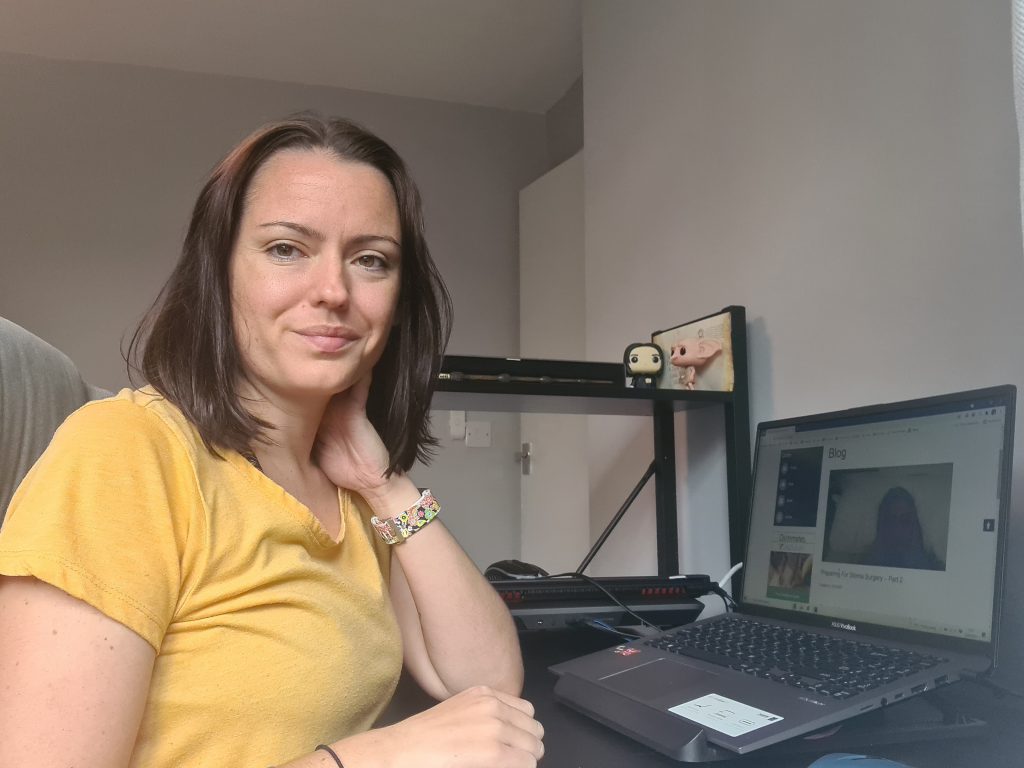
Disability Employment Awareness Month is actually an American observance. Having said that, we live on social media these days, which connects people all over the world together in one place. I think it’s an important topic, so, why can’t I jump on this bandwagon?
However, I am going to run with it in my own way, and make it UK relevant.
The definition of disabled is having a physical or mental impairment that has a substantial and long-term adverse effect on your ability to carry out normal day-to-day activities.
For some, a stoma has restored a sense of normality again. They may feel more able because of it. That said, there are different types of stoma, different reasons for needing one, and different lifestyles that we have become accustomed to that a stoma might have more of an impact on.
First, I just want to share a little info about disability rights, and then I want to share a little bit of my employment journey with you.
Equality
The Equality Act 2010 covers the rights of disabled people. It’s against the law for employers to discriminate against anyone because of a disability.
Recruitment
Employers are only legally allowed to ask limited questions about whether you have a health condition or disability on an application form or during an interview, for certain reasons.
Those reasons can be found here. If you are asked for reasons outside of this list then you may choose not to answer.
Reasonable adjustments
An employer legally has to make reasonable adjustments to avoid disabled people being put at a disadvantage compared to non-disabled people in the workplace. Reasonable adjustments may include things like providing a special piece of equipment to help you do a job, or adjusting your working hours.
Redundancy and retirement
A disabled person cannot be chosen for redundancy because of their disability. The process for selecting people for redundancy must be balanced and fair for all employees.
If you become disabled during your current employment, your employer cannot force you to retire. They must make reasonable adjustments to accommodate your needs, as above.
My experience
In 2007, I became very ill very fast. Within 3 weeks, I experienced my first symptoms, was diagnosed with ulcerative colitis, and had my first ileostomy. Because I was so unwell before surgery, and because of post-op complications; ileus, sepsis, and C-diff, the recovery was long and hard. When I finally went back to work, we arranged a phased return. I was supposed to increase my hours each week, but I reached a point where I felt stuck. My employer was pressuring me to increase my hours again and I didn’t feel like I could. I gave them a printed information sheet designed for employers by an IBD charity. Then, they arranged a meeting with HR. HR had read the information but had done her own search and decided that fatigue was a result of the surgery, and therefore they would give me a few more weeks before asking me to increase my hours again. I didn’t know what to do. A friend recommended I call ACAS, who advised me to get a doctor’s letter. They said I could call back if that didn’t help and they would assist me further. The letter from the GP did help, and my contractual hours were changed to match those who were working around children in school – which meant 9:10 am – 2:50 pm, rather than 6:55 am – 3:55 pm. It made the world of difference!
When I changed jobs, I knew I wasn’t looking for a full-time role. I chose to declare my health conditions on the application form because I wanted to be transparent and open about the fact that my health condition is changeable, and that sometimes I’d need time off for appointments. I actually started working for a company that was owned by a woman with Crohn’s disease. She understood the struggle! I started on 6 hour days, reduced to 5 when I was flaring, and ended up on flexitime when I was really unwell because I often spent nights awake, unable to sleep due to pain.
As an employee, I’ve actually always had the least sick leave and the best work ethic. My health was poor the majority of the time, and that meant that I’d learned how to just get on with the things that I needed to do. Sometimes, I was late. But if I arrived late, I left late.
When I left there, I started working for a magazine which allowed me to work from home two days a week. I started doing some freelance work on my work from home days because I felt like I’d gained some time back by skipping the commute. However, the fatigue rapidly caught up with me, so as soon as I had enough money coming in from freelancing to cover the bills, I left that job.
Working to my own schedule and allowing myself a better work-life balance works well for me. Not sharing a toilet is another bonus!
Have you had issues with work since having an ostomy? I’d love to hear your stories! You can share them with Fittleworth and myself on social media, or in the private Facebook group!
About the advice and opinions of our bloggers
We hope you enjoyed this article from our guest blogger. They are expressing their views or knowledge on a topic because of their experience & background. Some of the opinions expressed may not reflect the views of Fittleworth or your NHS professional.
It goes without saying, but this is not clinical advice. Each person will have an individual set of medical factors to consider. So please do not to make significant changes to your diet, exercise or treatments before consulting with an NHS professional.
Sahara was admitted to the hospital and diagnosed with Ulcerative Colitis at the age of 19, after just two weeks of being incredibly unwell. One week later, she had emergency surgery to remove her colon and rectum and had her first ileostomy. A turbulent journey followed; a multitude of treatments, complications, seven surgeries, a failed J-Pouch, and three ileostomies later, she is living with a permanent stoma and is a pro-active IBD and ostomy advocate.
Sahara joined the online IBD and ostomy community in 2014, and it very quickly became apparent to her that whilst awareness is important, even more, important than that is providing support to others as they navigate the stormy waters of life with IBD or an ostomy.
She runs #IBDSuperHeroes fundraising and awareness campaign, and the Facebook support group. She is a blogger for InflammatortyBowelDisease.net and an IBD Patient Consultant for merakoi – bridging the gap between patients and healthcare. She gets involved with research whenever she can, and is a volunteer for Cure Crohn’s Colitis, where she donates her time and expertise in social media marketing and content creation.
